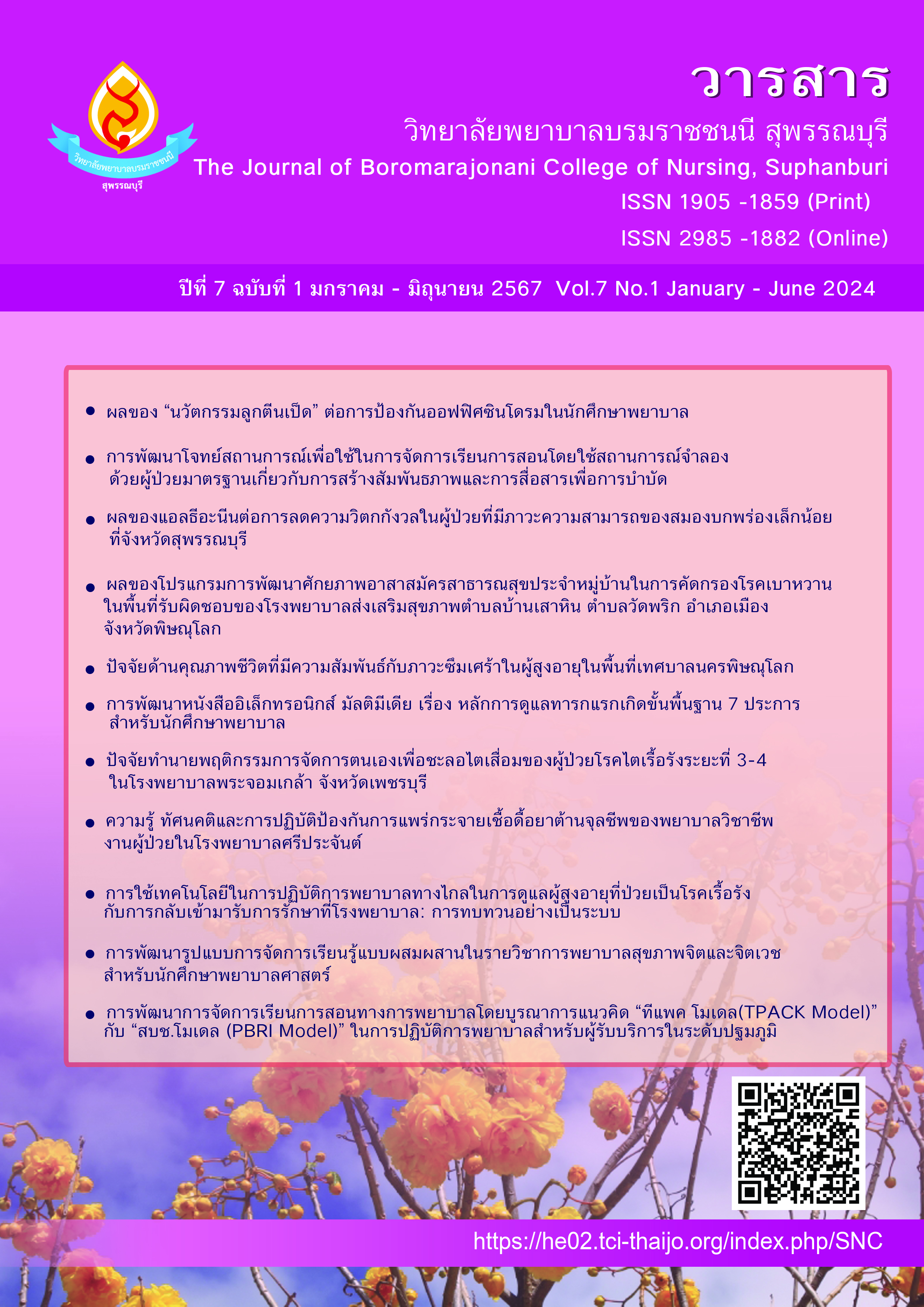Development of Scenario for Simulation-Based Learning with Standardized Patient about Therapeutic of Relationship and Communication
Keywords:
simulation- based learning, standardized patient, scenario, therapeutic of relationship, communication skillAbstract
This research aimed to develop and evaluate the effectiveness of scenarios for simulation based- learning with standardized patients regarding relationship building and therapeutic communication skills. The study consisted of four steps: 1) Assessing the problem conditions and needs regarding simulation problems among 116 third-year Bachelor of Nursing Science students at Boromarajonani College of Nursing, Suphanburi; 2) Developing scenarios by lecturers from the Department of Mental Health and Psychiatric Nursing; 3) Experimenting with the situational problems; and 4) Evaluating their effectiveness. The purposive sample comprised 92 third-year nursing students enrolled in Mental Health and Psychiatric Nursing Practicum, determined using Krejcie and Morgan's table.The research instruments included a questionnaire on problem conditions and needs, an interview form, a measurement of relationship building and therapeutic communication skills, and a student satisfaction questionnaire. The tools were validated by three experts, with a content validity index of 1.00 and Cronbach's alpha coefficients ranging from 0.88 to 0.92.
The results revealed: 1) The developed scenarios covered five essential elements: specific objectives, diversity in each phase, realistic scenarios, different communication techniques, and necessary basic information. There were five scenarios were created. 2) their effectiveness was evaluated. Post-intervention, nursing students' average scores for relationship building and therapeutic communication skills exceeded 80%, indicating proficiency. Student satisfaction was rated very good (M=4.64, SD=0.55). In conclusion, the scenarios were effectively facilitating the achievement of learning outcomes, and student satisfaction.
References
นงลักษณ์ คำสวาสดิ์, และวิไลลักษณ์ เผือกพันธ์. (2566). การจัดการเรียนการสอนโดยใช้สถานการณ์เสมือนจริงสำหรับนักศึกษาพยาบาล: การทบทวนวรรณกรรมอย่างเป็นระบบ. วารสารวิจัยและพัฒนาด้านสุขภาพ สำนักงานสาธารณสุขจังหวัดนครราชสีมา. 9(1), 5-17.
บุปผา ใจมั่น, วิจิตรา จิตรักษ์, โปรยทิพย์ สันตพันธุ์, และอนงค์ลักษณ์ วงศ์ตรี. (2567). ผลของโปรแกรมการเรียนรู้โดยใช้สถานการณ์จําลองการสร้างสัมพันธภาพเพื่อการบำบัดต่อการรับรู้ความสามารถในการใช้เทคนิคการสร้างสัมพันธภาพเพื่อการบำบัดของนักศึกษาพยาบาล. สหวิทยาการและความยั่งยืนปริทรรศน์ไทย, 13(1), 26-37.
มญช์พาณี ขำวงษ์, สุทธานันท์ กัลป์กะ, วิไลลักษณ์ ศิริมัย, และชาลินี หนูชูสุข. (2563). ผลของการเรียนรู้โดยใช้สถานการณ์จำลองต่อความมั่นใจในตนเองในการปฏิบัติทักษะการสนทนาเพื่อการบำบัดของนักศึกษาพยาบาล. วารสารวิทยาลัยพยาบาลบรมราชชนนี กรุงเทพ, 36(1), 201-211.
ละมัด เลิศล้ำ, ชนิดา ธนสารสุธี, สุภาเพ็ญ ปานะวัฒนพิสุทธิ์, และชัชรีย์ บำรุงศรี. (2562). การพัฒนารูปแบบการจัดการเรียนการสอนด้วยสถานการณ์จำลองเสมือนจริง. วารสารเครือข่ายวิทยาลัยพยาบาลและการสาธารณสุขภาคใต้, 6 ฉบับพิเศษ(6), 43-58.
วรางคณา คุ้มสุข, และมาเรียม นิลพันธุ์. (2564). การเรียนรู้โดยใช้สถานการณ์จำลองเสมือนจริง. วารสารสภาการสาธารณสุขชุมชน, 3(1), 1-11.
สุภาเพ็ญ ปานะวัฒนพิสุทธิ์, ละมัด เลิศล้ำ, และชนิดา ธนสารสุธี. (2562). การพัฒนารูปแบบโจทย์สถานการณ์เพื่อใช้ในการจัดการเรียนการสอนด้วยสถานการณ์จำลองเสมือนจริง. วารสารวิชาการสาธารณสุข, 28 ฉบับพิเศษ, 33-41.
สุนทรี ขะชาตย์, สุพัตรา จันทร์สุวรรณ, ปวิดา โพธิ์ทอง, และเสาวลักษณ์ ศรีโพธิ์. (2565). ได้พัฒนารูปแบบการจัดการเรียนรู้โดยใช้สถานการณ์จำลองด้วยผู้ป่วยมาตรฐานที่ส่งเสริมความรู้ ความมั่นใจในความสามารถของตนเองและทักษะการสื่อสารเพื่อการบำบัด. วารสารวิทยาลัยพยาบาลบรมราชชนนี สุพรรณบุรี, 5(2), 47-59.
สมจิตต์ สินธุชัย, กันยารัตน์ อุบลวรรณ, และสุนีย์รัตน์ บุญศิลป์. (2560). การเรียนรู้โดยใช้สถานการณ์จำลองเสมือนจริง: การนำไปใช้ในการจัดการเรียนการสอน. วารสารพยาบาลทหารบก, 18 (1), 29-38.
Forchuk, C., & Boyd, M. A. (2018). Communication Therapeutic and The Therapeutic Relationship in Mary Ann Boyd. Psychiatric Nursing: Contemporary Practice. Philadelphia: Wolters Kluwer.
Dwi, B., Zuhroidah, I & Sujarwadi, M. (2020). The Effectiveness of Standardized Patient and Role-play Simulation Methods in Improveing Self-confidence and Therapeutic Communication Skills of Nursing Students. Nursing Health Journal. 9 (1).
https://doi.org/10.36720/nhjk.vail.128.
Groom, J. A, Handerson, D., & Sittner, B. J. (2014). NLN/Jefferies Simulation Framework State
of Science Project: Simulation Design Characteristic. Clinical Simulation in Nursing,
, 337-334.
Jeffries. P.R., & Rogers. K. J. (2012). Theoretical Framework For Simulation Design in Simulation in Nursing Education. USA: Laerdal Medical Corporation.
Linda Wilson, & Samuel W. Price. (2015). Simulation Principles, Practice, and Mehodologies for Standardized Patient Simulation. In Linda Wilson & Ruth A Wittmann. Review Manual for the Certified Health Care Simulation Educator Exam. New york: Springger
Publishing Company, LLC.
Peplau, H. (1952). Interpersonal relations: A theoretical framework for application in nursing. New York: G. Putnam & Sons.
Suzanne, H. C., Natalia, D. A., & Ranjit, K. D. (2018). Teaching and Evaluating Therapeutic Communication in Suzanne, H. C., Simulated Scenarios. In Simulated Scenarios for Nursing Educator. New york: Springger Publishing Company, LLC.
Suzanne, A. F. (2019). Learning to communicate professionally in Norman, L. K. and Debbie, S. Psychiatric Nursing. Missouri: Elsevier.
Downloads
Published
Issue
Section
License
Copyright (c) 2024 Boromarajonani College of Nursing, Suphanburi

This work is licensed under a Creative Commons Attribution-NonCommercial-NoDerivatives 4.0 International License.
บทความที่ได้รับการตีพิมพ์เป็นลิขสิทธิ์ของวารสารวิทยาลัยพยาบาลบรมราชชนนี สุพรรณบุรี
ข้อความที่ปรากฏในบทความแต่ละเรื่องในวารสารวิชาการเล่มนี้เป็นความคิดเห็นส่วนตัวของผู้เขียนแต่ละท่านไม่เกี่ยวข้องกับวิทยาลัยพยาบาลบรมราชชนนี สุพรรณบุรี และคณาจารย์ท่านอื่นๆในวิทยาลัยฯ แต่อย่างใด ความรับผิดชอบองค์ประกอบทั้งหมดของบทความแต่ละเรื่องเป็นของผู้เขียนแต่ละท่าน หากมีความผิดพลาดใดๆ ผู้เขียนแต่ละท่านจะรับผิดชอบบทความของตนเองแต่ผู้เดียว



